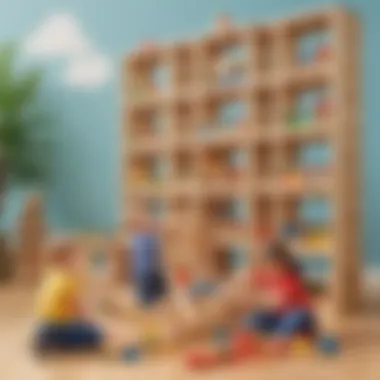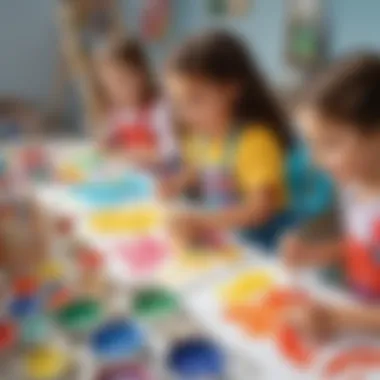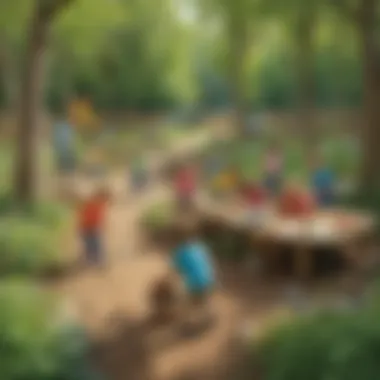Unlocking the Power of Free Play Activities for Kindergarten Kids


Fun Activities Ideas
Kindergarten is a crucial stage where children's minds are like sponges, eager to absorb the wonders of the world through play. Engaging them with stimulating activities is paramount to their overall growth and development. Let's delve into some exciting free play ideas perfect for kindergarteners!
Indoor Activities
When the weather confines the little ones indoors, fear not! Indoor activities can be just as entertaining and educational. Set up a storytelling corner with cozy cushions and colorful storybooks, allowing kids to explore the realms of imagination through words and pictures. Building forts with blankets and cushions not only sparks creativity but also enhances motor skills and spatial awareness. Introducing simple puzzles and building blocks can further engage their cognitive faculties, promoting problem-solving abilities.
Outdoor Adventures
Outdoor play is essential for kindergarteners to immerse themselves in the natural world and expend their boundless energy. Nature walks in the neighborhood park can be both educational and rejuvenating, as children discover insects, plants, and seasonal changes firsthand. Organizing scavenger hunts encourages teamwork, observation skills, and a sense of adventure. Additionally, setting up a mini gardening project fosters a love for nature and teaches responsibility as they care for plants and watch them grow.
Arts and Crafts
Unleash the young artist within your kindergartener through arts and crafts activities that stimulate their creativity and fine motor skills. Providing various art supplies like paints, colored paper, glue, and glitter opens up a world of possibilities for them to express themselves. From finger painting to making DIY masks or creating paper plate animals, each activity boosts self-expression and hand-eye coordination. Encouraging them to narrate stories about their creations enhances communication skills and imaginative thinking.
Science Experiments
Who says science is only for older kids? Kindergarteners can also enjoy simple and safe science experiments that make learning fun and interactive. Conducting experiments like mixing colors to create new ones, creating a volcano with baking soda and vinegar, or growing plants from seeds introduces them to basic scientific principles in a hands-on way. Exploring concepts like cause and effect, observation, and prediction lays the foundation for a lifelong love of science.
Cooking and Baking
Incorporating cooking and baking activities into playtime not only introduces kindergarteners to the basics of food preparation but also instills a sense of independence and healthy eating habits. Simple recipes like fruit kebabs, homemade pizzas, or no-bake cookies allow them to get hands-on experience in the kitchen under adult supervision. Learning to measure ingredients, mix, and taste the final product not only sharpens their math skills but also boosts their confidence and creativity in the culinary arts.
Understanding the Importance of Free Play
In this article, we delve into the crucial concept of understanding the importance of free play in the context of kindergarten education. Free play is not just a recreational activity; it serves as a vital component in a child's development, fostering creativity, imagination, and cognitive skills. By allowing children unstructured time to explore and engage with their surroundings without adult interference, free play lays the foundation for holistic growth and learning. It plays a significant role in shaping a child's social, emotional, and cognitive abilities, making it a cornerstone of early childhood education.
Promoting Creativity and Imagination
Encouraging Unstructured Play
Encouraging unstructured play is pivotal in promoting creativity and imagination in young children. It provides them with the freedom to invent, explore, and experiment without predetermined rules or outcomes. Unstructured play nurtures a child's innate curiosity and allows them to discover their interests and passions independently. This type of play sparks divergent thinking, enhancing problem-solving abilities and fostering a sense of innovation. Although unstructured play may seem chaotic, it cultivates adaptability and resilience in children, preparing them for real-world challenges.


Fostering Self-Expression
Fostering self-expression through play empowers children to communicate their thoughts, feelings, and ideas freely. Self-expression activities such as role-playing, storytelling, and art facilitate emotional expression and communication skills development. By encouraging children to express themselves creatively, caregivers and educators promote self-awareness and confidence. Fostering self-expression through play enables children to build a positive self-image and establish healthy coping mechanisms, contributing to their overall emotional well-being.
Enhancing Cognitive Development
Improving Problem-Solving Skills
Improving problem-solving skills through play enables children to tackle challenges, think critically, and devise solutions independently. Engaging in play-based problem-solving scenarios sharpens a child's analytical thinking and decision-making abilities. By facing obstacles and overcoming them in a playful setting, children develop resilience and persistence. Problem-solving play not only enhances cognitive abilities but also instills a growth mindset, encouraging children to approach problems with creativity and strategic thinking.
Boosting Decision-Making Abilities
Boosting decision-making abilities through play equips children with essential life skills and cultivates a sense of autonomy and responsibility. Decision-making play prompts children to assess situations, weigh options, and make informed choices. This process enhances their ability to evaluate consequences, prioritize tasks, and exercise judgment. By engaging in decision-making activities during play, children hone their confidence, assertiveness, and problem-solving acumen, preparing them for future challenges and responsibilities.
Benefits of Free Play Activities in Kindergarten
Free play activities in kindergarten offer numerous benefits that play a crucial role in the holistic development of young children. By engaging in unstructured play, children have the opportunity to explore, create, and learn in a natural and exciting way. One of the key elements of free play activities in kindergarten is the promotion of social skills, cognitive development, and emotional regulation.
Social Skills Development
In the realm of social skills development, children learn invaluable lessons that shape their interactions with others and foster meaningful relationships. Through free play activities, children build essential communication skills that allow them to express themselves effectively, listen attentively, and understand non-verbal cues. Developing strong communication abilities at a young age sets a solid foundation for future academic and social success. Moreover, honing teamwork abilities during playtime encourages children to collaborate, negotiate, and compromise with their peers. Enhancing teamwork skills cultivates a sense of belonging and cohesion within the group, promoting positive social dynamics.
Building Communication Skills
Building communication skills within the context of free play activities empowers children to articulate their thoughts, emotions, and ideas clearly. Effective communication is a fundamental aspect of successful relationships, both personal and professional. By engaging in activities that require verbal and non-verbal communication, children learn the art of expression and active listening, laying the groundwork for effective communication in various settings. The ability to communicate fluently and confidently enhances children's social interactions, boosts their self-esteem, and enriches their overall learning experiences.
Enhancing Teamwork Abilities
Enhancing teamwork abilities through free play activities equips children with valuable collaborative skills that are essential for navigating group dynamics. By working together towards a common goal during playtime, children learn the importance of cooperation, empathy, and shared responsibility. Teamwork fosters a sense of unity and camaraderie among children, instilling in them the values of collective achievement and mutual support. Cultivating teamwork abilities at a young age prepares children for future endeavors where collaboration is key to success.
Emotional Regulation and Resilience
In the realm of emotional regulation and resilience, free play activities serve as a playground for children to explore and understand their emotions. Managing stress levels and fostering emotional wellbeing are integral components of a child's emotional intelligence and mental wellness. Engaging in play that allows children to navigate challenging situations, express their feelings, and regulate their emotions promotes emotional resilience and psychological well-being.
Managing Stress Levels


The ability to manage stress levels effectively is a vital skill that children can develop through free play activities. By encountering mild stressors in a safe play environment, children learn to recognize and cope with stress in a healthy manner. Play activities that involve problem-solving, decision-making, and social interactions provide children with opportunities to experience and manage stress, ultimately building their resilience and adaptive abilities.
Fostering Emotional Wellbeing
Fostering emotional wellbeing through free play activities nurtures children's emotional intelligence and mental health. Creating a supportive and inclusive play environment where children feel heard, understood, and valued is essential for their emotional development. Play experiences that encourage emotional expression, self-reflection, and positive coping strategies contribute to children's emotional resilience and overall well-being. Fostering emotional wellbeing equips children with the tools to navigate challenges, build healthy relationships, and cultivate a positive self-image.
Practical Tips for Implementing Free Play in Kindergarten
In the realm of early childhood education, the practical tips for implementing free play in kindergarten hold paramount significance. These tips serve as the cornerstone for creating enriching and immersive play experiences that cater to the developmental needs of young learners. By offering structured yet flexible guidance, parents and educators can harness the power of play to foster creativity, enhance cognitive skills, and promote social interactions. The implementation of these tips transcends mere recreation; it becomes a vital vehicle for holistic growth and learning.
Creating a Play-Friendly Environment
Setting Up Play Stations
Setting up play stations involves strategically designing different areas within the classroom or play space, each dedicated to specific types of play activities. These stations can range from art corners for creative expression to sensory areas that stimulate tactile exploration. By organizing play stations, children are encouraged to engage in diverse play experiences, fostering multi-dimensional development.
Furthermore, the key characteristic of setting up play stations lies in promoting autonomy and decision-making among children. By allowing them to choose which station to explore, youngsters learn to assert their preferences and develop a sense of independence. This autonomy nurtures their self-esteem and confidence, laying a robust foundation for future learning endeavors.
The unique feature of setting up play stations is the opportunity it provides for differentiated instruction. Educators can tailor each station to cater to varied learning styles and preferences, ensuring that every child is actively engaged and deriving maximum benefit from the play environment. This personalized approach caters to the individual needs of students, promoting inclusivity and a sense of belonging within the classroom.
Incorporating Open-Ended Materials
Incorporating open-ended materials within play settings is essential for nurturing creativity, problem-solving skills, and critical thinking abilities in young children. Open-ended materials, such as blocks, clay, or loose parts, have no defined purpose, allowing kids to manipulate and explore them in endless ways. This freedom encourages imaginative play, where the only limit is a child's creativity.
The key characteristic of incorporating open-ended materials is their capacity to inspire curiosity and innovation. Unlike close-ended toys with predetermined functions, open-ended materials ignite a child's innate sense of exploration and experimentation. Through interacting with these materials, youngsters develop flexible thinking and adaptability, vital skills for navigating a world full of uncertainties.
A unique feature of incorporating open-ended materials is their ability to promote collaborative play and peer interaction. When children engage with these materials together, they learn the art of cooperation, communication, and shared decision-making. This collaborative spirit fosters a sense of community and teamwork among peers, laying the groundwork for healthy social dynamics within the play environment. The advantages of open-ended materials far outweigh any potential disadvantages, as they cultivate a rich tapestry of learning experiences for children in kindergarten.
Ideas for Engaging Free Play Activities
In the realm of early childhood education, incorporating engaging free play activities for kindergarten children is paramount. These activities provide a platform for young learners to explore, create, and learn in a hands-on manner. By integrating diverse and stimulating play experiences, children can enhance their cognitive abilities, motor skills, and social interactions. The significance of incorporating a variety of play activities lies in catering to different learning styles and interests among children, ensuring comprehensive growth and development.
Art and Craft Exploration
Painting and Drawing


Diving into the realm of painting and drawing with kindergarten children can unlock a world of creativity and self-expression. This creative outlet allows children to experiment with colors, shapes, and textures, fostering their artistic skills and imagination. Painting and drawing activities encourage children to communicate visually, explore their emotions, and unleash their inner artist. By engaging in such activities, children can develop fine motor skills, hand-eye coordination, and attention to detail, laying a foundation for future artistic pursuits.
Sensory Play
Sensory play, characterized by hands-on experiences that stimulate the senses, offers numerous benefits to young learners. Through sensory activities such as exploring different textures, scents, and sounds, children engage in experiential learning, enhancing their cognitive abilities and sensory awareness. Sensory play not only fosters sensory exploration but also promotes language development, problem-solving skills, and emotional regulation. By immersing children in sensory-rich environments, educators can cater to individual learning preferences and create enriching play experiences.
Outdoor Adventures
Nature Scavenger Hunts
Nature scavenger hunts present an exciting opportunity for children to connect with the natural world and explore their surroundings. By embarking on nature scavenger hunts, children develop observation skills, curiosity about the environment, and appreciation for biodiversity. These hunts promote physical activity, collaboration, and problem-solving as children hunt for specific items or engage in nature-themed challenges. Nature scavenger hunts not only encourage outdoor exploration but also foster a sense of wonder, environmental consciousness, and scientific inquiry among young learners.
Obstacle Courses
Obstacle courses offer a dynamic and engaging way for children to enhance their physical and cognitive abilities through play. By navigating through various obstacles such as tunnels, balance beams, and climbing structures, children improve their gross motor skills, coordination, and spatial awareness. Obstacle courses also encourage perseverance, risk-taking in a safe environment, and teamwork as children navigate challenges together. By incorporating obstacle courses into play activities, educators can promote physical fitness, problem-solving, and social interaction, creating an engaging and rewarding play experience for kindergarten children.
Evaluating the Impact of Free Play on Kindergarten Learning
In this section, we delve into the critical aspect of assessing how free play influences kindergarten learning. Understanding the impact of free play on young learners is paramount to creating enriching educational experiences. By evaluating the effects of free play activities, we can uncover the significance of play in cognitive and social development.
Measuring Developmental Milestones
Cognitive Progress
Exploring cognitive progress in relation to free play activities sheds light on the intellectual advancements children experience through play. Cognitive progress encompasses areas such as problem-solving skills, memory retention, and critical thinking abilities. By engaging in free play, children have the opportunity to enhance their cognitive functions, leading to improved academic performance and overall mental agility.
Social Skills Growth
The growth of social skills through free play is a fundamental component of kindergarten learning. Social skills development includes aspects like communication, cooperation, and empathy. By participating in collaborative play activities, children learn to navigate social interactions, resolve conflicts, and develop a sense of empathy towards their peers. Enhancing social skills through free play fosters a positive social environment and lays the foundation for strong interpersonal relationships.
Parent and Educator Perspectives
Gaining insights from parent and educator perspectives plays a vital role in understanding the impact of free play on kindergarten learning. Parents and educators serve as key observers of children's behavior and development during play sessions, providing valuable feedback and guidance. By actively engaging with children during play, adults can observe their interests, strengths, and areas for improvement, facilitating a holistic approach to developmental monitoring.
Observations and Feedback
Observations and feedback from parents and educators offer valuable insights into children's responses to different play activities. By keenly observing how children engage with various play materials and interact with their peers, adults can tailor play experiences to suit individual learning styles and preferences. Feedback from parents and educators also enables ongoing communication and collaboration, enhancing the overall quality of play experiences.
Challenges and Success Stories
Exploring the challenges and success stories associated with free play activities provides a well-rounded view of the impact of play on kindergarten learning. Challenges may include instances of conflict resolution, overcoming obstacles, or adapting play strategies to meet diverse needs. Success stories highlight moments of triumph, growth, and skill development observed during play sessions, underscoring the positive outcomes of immersive and engaging play experiences.



